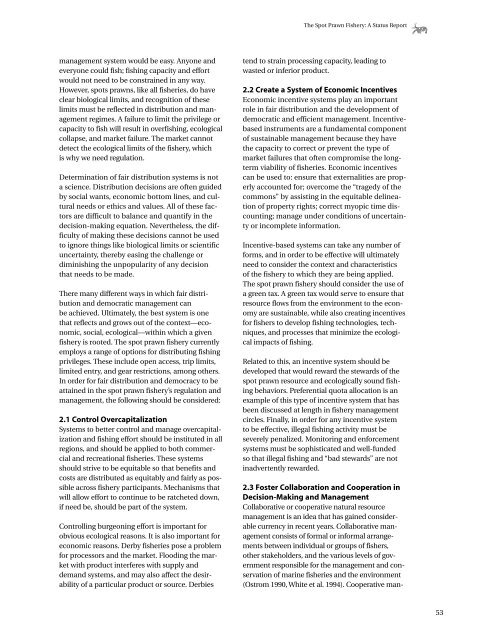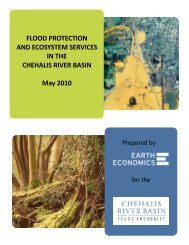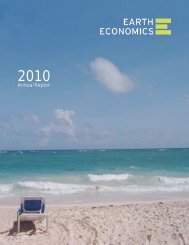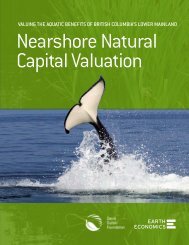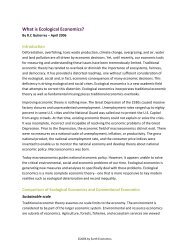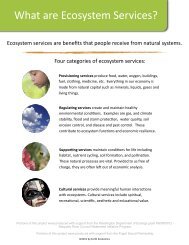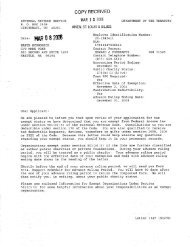The Spot Prawn Fishery: A Status Report - Earth Economics
The Spot Prawn Fishery: A Status Report - Earth Economics
The Spot Prawn Fishery: A Status Report - Earth Economics
Create successful ePaper yourself
Turn your PDF publications into a flip-book with our unique Google optimized e-Paper software.
<strong>The</strong> <strong>Spot</strong> <strong>Prawn</strong> <strong>Fishery</strong>: A <strong>Status</strong> <strong>Report</strong><br />
management system would be easy. Anyone and<br />
everyone could fish; fishing capacity and effort<br />
would not need to be constrained in any way.<br />
However, spots prawns, like all fisheries, do have<br />
clear biological limits, and recognition of these<br />
limits must be reflected in distribution and management<br />
regimes. A failure to limit the privilege or<br />
capacity to fish will result in overfishing, ecological<br />
collapse, and market failure. <strong>The</strong> market cannot<br />
detect the ecological limits of the fishery, which<br />
is why we need regulation.<br />
Determination of fair distribution systems is not<br />
a science. Distribution decisions are often guided<br />
by social wants, economic bottom lines, and cultural<br />
needs or ethics and values. All of these factors<br />
are difficult to balance and quantify in the<br />
decision-making equation. Nevertheless, the difficulty<br />
of making these decisions cannot be used<br />
to ignore things like biological limits or scientific<br />
uncertainty, thereby easing the challenge or<br />
diminishing the unpopularity of any decision<br />
that needs to be made.<br />
<strong>The</strong>re many different ways in which fair distribution<br />
and democratic management can<br />
be achieved. Ultimately, the best system is one<br />
that reflects and grows out of the context—economic,<br />
social, ecological—within which a given<br />
fishery is rooted. <strong>The</strong> spot prawn fishery currently<br />
employs a range of options for distributing fishing<br />
privileges. <strong>The</strong>se include open access, trip limits,<br />
limited entry, and gear restrictions, among others.<br />
In order for fair distribution and democracy to be<br />
attained in the spot prawn fishery’s regulation and<br />
management, the following should be considered:<br />
2.1 Control Overcapitalization<br />
Systems to better control and manage overcapitalization<br />
and fishing effort should be instituted in all<br />
regions, and should be applied to both commercial<br />
and recreational fisheries. <strong>The</strong>se systems<br />
should strive to be equitable so that benefits and<br />
costs are distributed as equitably and fairly as possible<br />
across fishery participants. Mechanisms that<br />
will allow effort to continue to be ratcheted down,<br />
if need be, should be part of the system.<br />
Controlling burgeoning effort is important for<br />
obvious ecological reasons. It is also important for<br />
economic reasons. Derby fisheries pose a problem<br />
for processors and the market. Flooding the market<br />
with product interferes with supply and<br />
demand systems, and may also affect the desirability<br />
of a particular product or source. Derbies<br />
tend to strain processing capacity, leading to<br />
wasted or inferior product.<br />
2.2 Create a System of Economic Incentives<br />
Economic incentive systems play an important<br />
role in fair distribution and the development of<br />
democratic and efficient management. Incentivebased<br />
instruments are a fundamental component<br />
of sustainable management because they have<br />
the capacity to correct or prevent the type of<br />
market failures that often compromise the longterm<br />
viability of fisheries. Economic incentives<br />
can be used to: ensure that externalities are properly<br />
accounted for; overcome the “tragedy of the<br />
commons” by assisting in the equitable delineation<br />
of property rights; correct myopic time discounting;<br />
manage under conditions of uncertainty<br />
or incomplete information.<br />
Incentive-based systems can take any number of<br />
forms, and in order to be effective will ultimately<br />
need to consider the context and characteristics<br />
of the fishery to which they are being applied.<br />
<strong>The</strong> spot prawn fishery should consider the use of<br />
a green tax. A green tax would serve to ensure that<br />
resource flows from the environment to the economy<br />
are sustainable, while also creating incentives<br />
for fishers to develop fishing technologies, techniques,<br />
and processes that minimize the ecological<br />
impacts of fishing.<br />
Related to this, an incentive system should be<br />
developed that would reward the stewards of the<br />
spot prawn resource and ecologically sound fishing<br />
behaviors. Preferential quota allocation is an<br />
example of this type of incentive system that has<br />
been discussed at length in fishery management<br />
circles. Finally, in order for any incentive system<br />
to be effective, illegal fishing activity must be<br />
severely penalized. Monitoring and enforcement<br />
systems must be sophisticated and well-funded<br />
so that illegal fishing and “bad stewards” are not<br />
inadvertently rewarded.<br />
2.3 Foster Collaboration and Cooperation in<br />
Decision-Making and Management<br />
Collaborative or cooperative natural resource<br />
management is an idea that has gained considerable<br />
currency in recent years. Collaborative management<br />
consists of formal or informal arrangements<br />
between individual or groups of fishers,<br />
other stakeholders, and the various levels of government<br />
responsible for the management and conservation<br />
of marine fisheries and the environment<br />
(Ostrom 1990, White et al. 1994). Cooperative man-<br />
53


